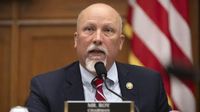On Thursday, April 10, 2025, the U.S. House of Representatives passed the Safeguard American Voter Eligibility (SAVE) Act, a controversial piece of legislation that voting rights advocates warn could disenfranchise millions of eligible voters. The bill, which passed by a narrow margin of 220 to 208, mandates that individuals provide documentary proof of U.S. citizenship when registering to vote or updating their voter registration information.
Sponsored by Republican Rep. Chip Roy of Texas, the SAVE Act aims to strengthen voting integrity by requiring voters to present documents such as a passport, birth certificate, or other citizenship verification when registering. Proponents argue that the legislation is necessary to prevent noncitizens from voting, a practice that is already illegal and extremely rare. However, critics contend that the bill poses significant barriers to voting, particularly for women and marginalized communities.
Voting rights groups estimate that approximately 69 million American women and 4 million men do not have a birth certificate that matches their current legal name, which could complicate their ability to register under the new requirements. More than 21 million citizens of voting age, or over 9 percent, do not have readily available documents that prove their citizenship. This raises concerns about how the SAVE Act could disproportionately impact those who have changed their names due to marriage, assimilation, or gender identity.
During the debate, Rep. Joe Morelle, a Democrat from New York, criticized the bill, stating, "My Republican colleagues crafted and passed one of the most damaging voter suppression bills in modern history. There’s no doubt that women, military members, and people of color will be disproportionately impacted." Morelle vowed to continue fighting to protect Americans' right to vote.
The SAVE Act also includes provisions requiring states to remove undocumented immigrants from voter rolls and allows American citizens to sue election officials who fail to comply with the proof of citizenship requirements. Rep. Roy defended the bill, asserting, "In order to preserve this republic, we must uphold what it means to be able to vote in a U.S. election." He expressed gratitude to his colleagues for supporting what he deemed a critical step toward ensuring election integrity.
However, the bill's future remains uncertain as it heads to the Senate, where Republicans hold a slim 53-seat majority. To pass, the legislation will need at least 60 votes to overcome a potential filibuster. The Senate's Majority Leader, John Thune, R-S.D., has co-sponsored the bill, but bipartisan support will be crucial for its advancement.
The SAVE Act is not the first attempt to impose proof of citizenship requirements for voting. Similar measures have been introduced in various states, often facing legal challenges and opposition from voting rights advocates. Critics argue that such laws create unnecessary obstacles to voting, particularly for low-income individuals and those living in rural areas who may struggle to access the necessary documentation.
In a recent review of voting practices in Michigan, officials identified 15 individuals who appeared to be noncitizens among the more than 5.7 million ballots cast in the 2024 general election. Out of those, 13 cases were referred for potential criminal charges. Michigan Secretary of State Jocelyn Benson emphasized that illegal voting by noncitizens is exceedingly rare, stating, "Our careful review confirms what we already knew – that this illegal activity is very rare. While we take all violations of election law very seriously, this tiny fraction of potential cases does not justify recent efforts to pass laws that would block tens of thousands of Michigan citizens from voting in future elections."
The SAVE Act would take effect immediately upon becoming law, applying to all voter registration applications. This means that individuals who have changed their names or moved would need to provide proof of citizenship to update their registration, potentially complicating the voting process for many.
Voting rights advocates have raised alarms about the potential for the SAVE Act to eliminate popular registration methods, such as online, mail, and registration drives. These methods have been crucial for encouraging voter participation, especially among underrepresented groups. The legislation could add significant demands on election officials, particularly those in women-led election workforces who have faced burnout and harassment in recent years.
As the debate continues, the implications of the SAVE Act could resonate far beyond the halls of Congress. If passed, it may reshape the landscape of voting rights in the United States, raising questions about accessibility, equity, and the fundamental right to vote.
In conclusion, the SAVE Act represents a pivotal moment in the ongoing struggle over voting rights in America. With its passage in the House, the legislation now faces the critical test of the Senate, where its future remains uncertain. As advocates on both sides prepare for the next phase of this contentious debate, the stakes could not be higher for millions of Americans who seek to exercise their right to vote.







